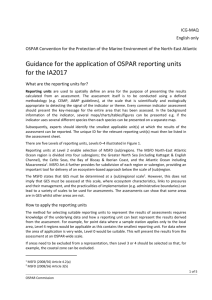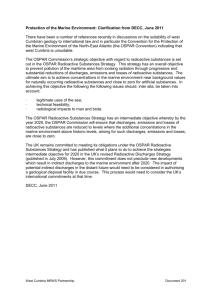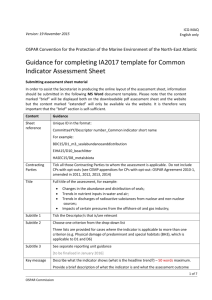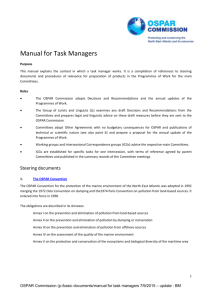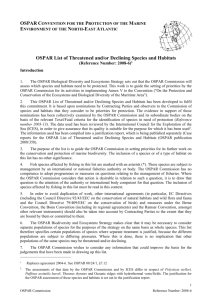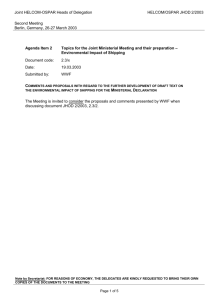OSPAR_IA2017
advertisement
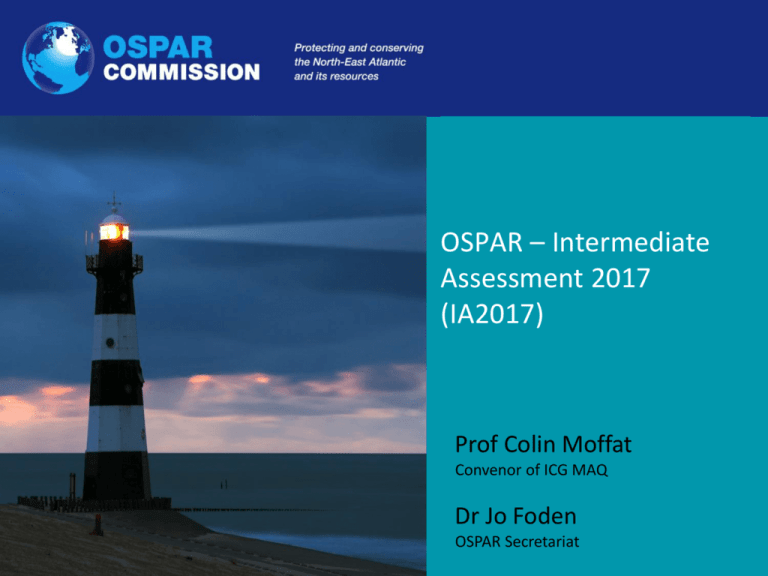
www.ospar.org OSPAR – Intermediate Assessment 2017 (IA2017) Prof Colin Moffat Convenor of ICG MAQ Dr Jo Foden www.ospar.org OSPAR Secretariat OSPAR Commission 16 Contracting Parties • Belgium • Denmark • Finland • France • Germany • Iceland • Ireland • Luxembourg • The Netherlands • Norway • Portugal • Spain OSPAR Maritime Area and Regions: • Sweden Region I: Arctic Waters • Switzerland Region II: Greater North Sea • The United Kingdom Region III: Celtic Seas • European Union Region IV: Bay of Biscay/Iberian Coast Not an EU Member State www.ospar.org Region V: Wider Atlantic Dual Procedures – Single Track The North East Atlantic Strategy. OSPAR Agreement 2010-3 clean & healthy MSFD JAMP EU Marine Strategy Framework Directive (MSFD) (Directive 2008/56/EC) JAMP 2014 - 2021 OSPAR Agreement 2014-02 dynamic oceans and seas which are clean, healthy and productive Commission Decision 2010/477/EU concerning MSFD criteria for assessing GES www.ospar.org OSPAR Strategies and Committees Biodiversity and Ecosystem Strategy Offshore Industry Strategy Eutrophication Strategy OIC HASEC BDC and EIHA N E A S www.ospar.org Radioactive Substances Strategy RSC Hazardous Substances Strategy HASEC A Strategy for the Joint Assessment and Monitoring Programme (JAMP) Theme A – CoG; BDC, EIHA, OIC, RSC, HASEC for their respective Theme Joint Assessment and Monitoring Programme (JAMP) Section I: overall strategy, objectives for 2014-2021 and the longer term, guiding principles, the means to ensure scientific quality, the relationship with marine research, and the programme management Section II: for each of six themes, details the issues to be addressed, the monitoring programmes to be implemented, the monitoring and assessment tools to be developed, the information and data collection to be undertaken and the assessments reports or products to be produced. OSPAR Agreement 2014-02 www.ospar.org MSFD D1 D2 D3 D4 D5 D6 D7 D8 D9 D10 D11 Good Env Status (GES) Not GES DX DX MSFD Descriptor Definitions For GES Descriptor X OSPAR Strategies/CEMPs for relevant OSPAR Theme www.ospar.org Indicator development and implementation of monitoring programmes General Assessments from OSPAR Strategies and MSFD GES DX Y Criteria Z Indicators Assessments e.g. IA2017 Comparison of Areas 0°N Baltic Sea Celtic Seas Macaronesia 0°N Greater North Sea Bay of Biscay and the Iberian Coast Black Sea OSPAR Region MSFD Subregions I Celtic Seas (small %) II Greater North Sea III Celtic Seas IV Bay of Biscay and Iberian Coast V Macronesia, Celtic Seas, Bay of Biscay and Iberian Coast Adriatic Sea Aegean-Levantine Sea Western Mediterranean Sea Ionian Sea and the Central Mediterranean Sea Macaronesia 0°N 20°W 30°W 10°W 0° 10°E 20°E 30°E Representation of the marine regions and subregions of MSFD Article 4, and the marine waters of Member States according to Article 3(1) 100% shading: seabed, subsoil and water column seabed and subsoil only and 66% asshading: reported by waters Member States / WFD transitional waters / third countries outside MS marine shading: 33% Representation of the marine regions and subregions of MSFD Article 4, and the marine waters of Member States according to Article 3(1) and as reported by Member States Baltic Sea North-east Atlantic Ocean www.ospar.org North Sea, incl. the Kattegat and the English Channel Greater Celtic Seas MSFD outer boundary status Median line, 200 nm limit or continental shelf claim not yet agreed by treaty Agreed by treaty Committee/ group ICG-MAQ Thematic committee meetings e.g. BDC, HASEC, EIHA ICGs/ Working groups COG OSPAR 2015 Product/decision Date Guidance provided on Spring 2015 - Structure of the IA2017 - The Assessment sheet structure/ template with explanatory notes - Assessment units - Timetable for delivery of assessment products Thematic committees recommend to OSPAR Commission which indicators Spring 2015 and other thematic assessments will feature in the IA 2017. For the identified assessments develop detailed work plans to ensure delivery of a draft assessment sheet to the 2016 committee meeting. Start assessment process Spring 2015 Review contents and structure of the IA2017 from committees Conclusion on which indicators/ thematic assessments will feature in the IA 2017 May 2015 29th May 2015 Decision on overall structure and outline of content of the IA 2017 ICGs and working groups NOW!!! YIKES Finalise draft assessment sheets www.ospar.org (document deadline) OSPAR 22-27 June 2015 Between OSPAR 2015 and thematic committee meetings in Spring 2016 Committee Product/decision /group ICG-MAQ Initial outline draft of “top and tail” Date Thematic committee meetings e.g. BDC, HASEC, EIHA ICGs and working groups OSPAR 2016 Spring 2016 TBC (CoG? Committees ’ written procedure? Or Webex?) Review and agree completed assessments sheets Autumn 2015 Identify any data gaps and address deficiencies. Make arrangements to address these. Finalise assessments if necessary By end August 2016 Decides on final draft content based on completed assessment sheets June 2016 and other contributions Sign off of any revised/ updated assessment sheets. September 2016 www.ospar.org Committee/ group Product/decision ICG-MAQ Oversee compilation and finalisation of IA 2017 (supported by thematic committees and ICGs/working groups – checking drafts, providing updates where new data are available.) Date June 2016 to thematic committees in Spring 2017 Thematic drafts to be finalised for submission to Committees in spring 2017 Final editing of text IA 2017 Spring 2017 Sign off of final relevant sections of IA2017 Spring 2017 ICG-MAQ Thematic committee meetings e.g. BDC, HASEC, EIHA ICG-MAQ Final review, compilation and preparation for publication OSPAR 2017 IA2017 adopted Contracting Parties IA2017 sent out for national consultation as part of Article 8 assessment forresponses a restand – provide Ah, but, ICGs, working ReviewTime consultation update if required. groups and New assessments to be considered for inclusion what about the EEA State Thematic of European Seas Report committee in 2019 and QSR 2021? meetings e.g. BDC, HASEC, EIHA ICG-MAQ Editorial adjustments of IA 2017 if required OSPAR 2018 Post consultation IA2017 adopted www.ospar.org Late spring 2017 June 2017 Autumn 2017 Spring 2018 Spring 2018 June 2018 OSPAR Common Indicators OSPAR Region Number Descriptors D1/6, D5, 8, D10, II, III, IV 17 D11 IV 4 D1, D4, D5 Link to HELCOM Core (30) III 6 D1, D4 Indicators D1, D1/6, D5, D8, II 14 D10 Total = 41 www.ospar.org D1/6 BentHab2 D5 nutr conc D5 chlorophyl D5 oxygen D8 metals (biota) D8 metals (sedim) D8 PCBs (biota) D8 PCBs (sedim) D8 PAHs (sedim) D8 PAHs (biota) D8 Organotin (sedim) D8 PBDE (biota) D8 PBDE (sedim) D8 imposex D10 on beach D10 on seabed D11 impulsive noise Multi-metric indices Winter nutrient concentrations Chlorophyll concentration Oxygen Metal (Hg, Cd, Pb) concentrations in biota Metal (Hg, Cd, Pb) concentrations in sediment PCB concentrations in biota PCB concentrations in sediments PAHs concentrations in sediments PAHs concentrations in biota other than fish Organotin concentrations in sediments PBDE concentrations in biota PBDE concentrations in sediments Imposex/intersex Beach litter Litter on the seabed Impulsive noise OSPAR Wide Common Indicators www.ospar.org Geographical Scales for assessment and reporting Level 0 OSPAR Maritime Area (As of 5 days ago) Level 1 OSPAR Regions (I – V) Level 2 subdivision of OSPAR Regions Level 3 offshore areas of coastal influence Level 4 Country specific – can be WFD waterbodies if CP desires(As of 5 days ago) www.ospar.org Level 0 OSPAR Maritime Region Level 0 www.ospar.org Level 1: OSPAR Regions www.ospar.org Level 2: sub division of OSPAR Regions www.ospar.org Level 3: Area of Coastal Influence www.ospar.org Level 4: Country Specific, Can be WFD Coastal Waters www.ospar.org Level 4: zoom in on North Sea www.ospar.org Anomalies still to be addressed www.ospar.org Building blocks of IA2017 Chapter 1 Introduction, including: • North-East Atlantic Environment Strategy • Intermediate Assessment 2017 • How the IA2017 contributes to the MSFD • Common Indicators Chapter 2 Climate change/Prevailing Physiographic Conditions Chapter 3 Socioeconomic characteristic of the OSPAR area Chapter 4 Human Activities Chapter 5 Biodiversity Status Chapter 6 Ecosystem assessment Chapter 7 Conclusions and Recommendations NOT A MINI QSR www.ospar.org Assessment sheets • Online report only • 2-page summary assessments, underpinned by extended data and information Content Sheet reference Contributing countries Title Example Assessment ID (to be completed by Secretariat) Subtitle 1 Component from a list (TBC) descriptor (e.g. food webs, marine litter) or thematic assessment (e.g. radioactive discharges, MPAs) Subtitle 2 Subtitle 3 MSFD criterion e.g. ‘1.2 Population size’ Region of the assessment (using the ‘hierarchical’ scales unique identifier, if adopted) Countries that have contributed to the assessment. Complete using two letter ISO country codes. Assessment XXX: NAME e.g. ‘Common Indicator PH-1: Plankton Life Forms’. Area of applicability – shown as a small map Key message Describe what the indicator shows (what is the headline trend) – 50 words maximum Background A clear introduction to the topic, with an image, 250 words maximum. (brief) a. Describing why it is an indicator and of what [insert textual ref to OSPAR Agreement] b. Include a brief description of key drivers/pressures www.ospar.org JAMP - An Area for Development Integrated environmental assessment: assessments that link human activities, their pressures, the state of the marine environment and management responses with the inclusion of the relevant physics, chemistry and/or biology. www.ospar.org OSPAR Data and Information Management System www.ospar.org Thank you • Secretariat@ospar.org • Watch this space: www.ospar.org Photo: NOAA www.ospar.org
